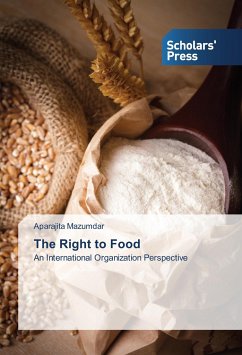Food, a fundamental need for human survival, has been gradually and widely accepted as a basic human right. The United Nations system has formally and firmly established the right to food through a set of international standards, while the national and local governments are responsible to ensure its realisation and implementation. This book attempts to capture the evolving normative content of the right to food, situating it within the broad UN human rights paradigm and the obligation of realising it based on debates regarding justiciability and enforcement mechanisms. The importance of addressing global food security from a rights-based perspective lies in the internationalising the right to be free from hunger and the right to adequate food as essential human rights for all people everywhere, obligating states to pursue activities for its implementation and international institutional monitoring and supervision for its realisation. Advocacy and publicity at policy level are themajor mechanisms available to the international community for generating global awareness, thereby profoundly influencing global food security.








